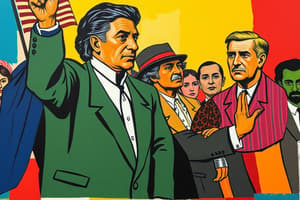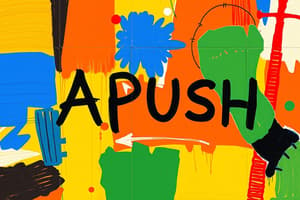Podcast
Questions and Answers
What marks the beginning and end of APUSH Period 1?
What marks the beginning and end of APUSH Period 1?
1491 and 1607
What does autonomy mean in the context of Native Americans and Africans?
What does autonomy mean in the context of Native Americans and Africans?
Self-government or independence
What is subjugation?
What is subjugation?
Taking control of a person or group by force
What crops did Native Americans build societies around?
What crops did Native Americans build societies around?
What was the Columbian Exchange?
What was the Columbian Exchange?
What was the encomienda system?
What was the encomienda system?
Describe Native American life in the Great Plains and Great Basin.
Describe Native American life in the Great Plains and Great Basin.
What two technological improvements aided European exploration?
What two technological improvements aided European exploration?
What impact did the Columbian Exchange have on Europe?
What impact did the Columbian Exchange have on Europe?
What impact did the Columbian Exchange have on Native Americans?
What impact did the Columbian Exchange have on Native Americans?
How did the Columbian Exchange affect Africans?
How did the Columbian Exchange affect Africans?
How did the encomienda system affect Native Americans?
How did the encomienda system affect Native Americans?
What replaced the encomienda system?
What replaced the encomienda system?
How did Europeans typically view Native Americans?
How did Europeans typically view Native Americans?
In what ways did Africans preserve autonomy in the Western Hemisphere?
In what ways did Africans preserve autonomy in the Western Hemisphere?
Flashcards are hidden until you start studying
Study Notes
Period Overview (1491-1607)
- 1491 marks the year before Columbus's arrival in the Americas, while 1607 marks the establishment of Jamestown, Virginia, the first permanent English settlement.
- Focus on Native American life before extensive European contact and the significant effects of the Columbian Exchange.
Autonomy
- Refers to self-government and independence; Native Americans and Africans sought to maintain autonomy amidst European colonization.
Subjugation
- The act of controlling a group by force; Native Americans and Africans experienced subjugation through European colonization, many falling into slavery.
Maize
- Corn originally grown in present-day Mexico, foundational to Native American societies in the U.S.; introduced to Europe through the Columbian Exchange, leading to population growth.
Columbian Exchange
- A historical exchange of plants, animals, diseases, and technologies between the Americas and the wider world initiated by Columbus's voyages.
Encomienda System
- A Spanish colonial system granting land to colonists in the New World, leading to the exploitation of Native Americans, whose labor was eventually replaced by African slaves.
Native American Lifestyles by Region
- Great Plains/Great Basin: Primarily hunters with limited resources.
- Southwest: Foragers and hunter-gatherers, with fishing practices.
- Northeast: Engaged in hunting and farming, utilizing maize.
Technological Improvements Enabling Exploration
- Sextant: A navigational instrument for determining latitude and longitude.
- Joint stock companies: Collective investment by individuals to finance explorations.
Impact of the Columbian Exchange on Europe
- Introduction of new goods like potatoes and maize, which significantly boosted populations.
- Economic shift from feudalism to capitalism.
Impact of the Columbian Exchange on Native Americans
- European diseases led to a devastating decline in the Native population, with over 90% mortality in some areas.
- Introduction of horses and guns transformed hunting and warfare.
Impact of the Columbian Exchange on Africans
- The exchange spurred an increase in the transatlantic slave trade, particularly involving Portuguese and Spanish traders in West Africa.
Effects of the Encomienda System on Natives
- Native Americans were forced into slavery and labor, often harshly treated and compelled to convert to Christianity.
Replacement of the Encomienda System
- The labor source shifted to African slaves, marking a transition in labor systems in the colonies.
European Perspectives on Natives
- Europeans often labeled Native Americans as "uncivilized," reflecting cultural biases and justifications for subjugation.
African Autonomy in the Western Hemisphere
- Africans maintained autonomy by blending Christianity with traditional beliefs and forming marron communities composed of runaway slaves.
Studying That Suits You
Use AI to generate personalized quizzes and flashcards to suit your learning preferences.




